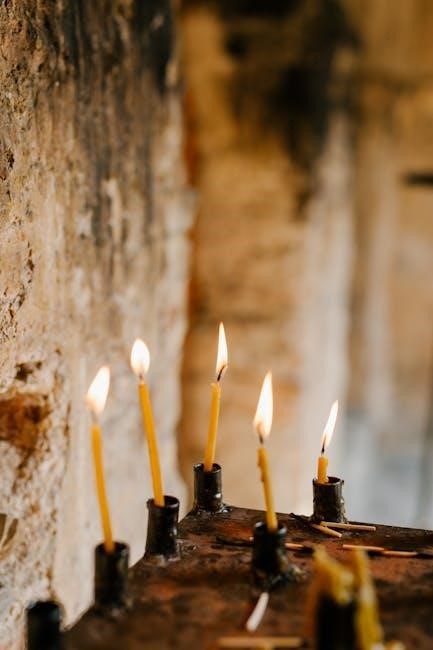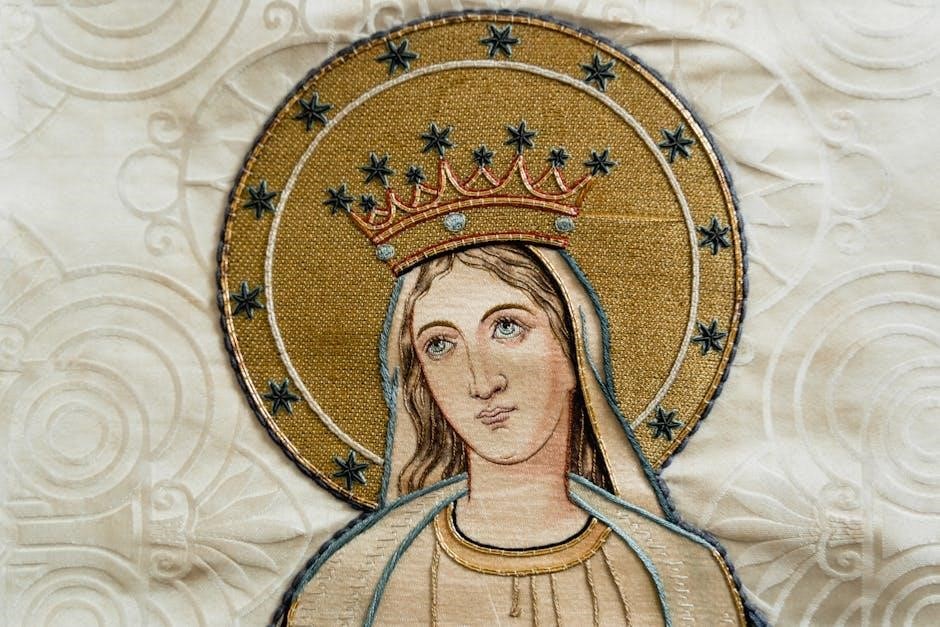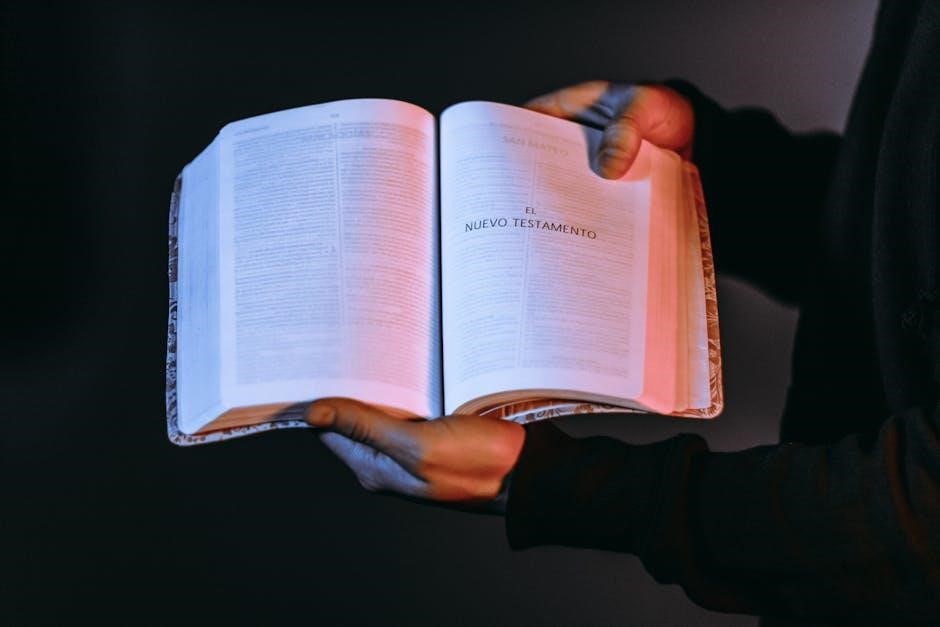The Divine Mercy Novena Prayer, revealed to St. Faustina Kowalska, is a nine-day devotion beginning on Good Friday. It emphasizes God’s infinite mercy and compassion, offering prayers for various intentions each day, leading up to Divine Mercy Sunday.
Origins and Significance of the Divine Mercy Novena
The Divine Mercy Novena, rooted in Catholic tradition, was revealed to St. Faustina Kowalska in the 1930s. Jesus appeared to her, emphasizing His mercy and requesting a nine-day prayer beginning on Good Friday. The novena’s significance lies in its focus on God’s infinite compassion and forgiveness, offering prayers for various groups, including sinners, priests, and the faithful departed. This devotion, officially recognized by the Church, underscores the transformative power of mercy in spiritual growth and renewal, aligning with the feast of Divine Mercy Sunday. Its global adoption reflects its universal appeal and profound impact on fostering trust in God’s loving mercy.
Structure and Duration of the Novena
The Divine Mercy Novena is structured as a nine-day prayer devotion, typically beginning on Good Friday. Each day focuses on specific intentions, such as praying for sinners, priests, or the faithful departed. The novena concludes on Divine Mercy Sunday. Participants recite the Chaplet of Divine Mercy daily, often using rosary beads, alongside optional opening and closing prayers. The duration is strictly nine days, with each day dedicated to a unique group of souls. This structured approach ensures a focused and intentional prayer experience, deepening one’s understanding and trust in God’s mercy. The novena’s clear format makes it accessible to individuals and communities worldwide, fostering unity in prayer.

How to Pray the Chaplet of Divine Mercy
The Chaplet of Divine Mercy is prayed using rosary beads, beginning with the Sign of the Cross, followed by the Our Father, Hail Mary, and Apostles’ Creed. Optional opening prayers may be recited, emphasizing God’s mercy. The Chaplet consists of repeating the “Eternal Father” prayer and the “For the sake of His sorrowful Passion” prayer, concluding with three repetitions of the final prayer. This devotion is a powerful way to implore divine mercy for oneself and others, fostering trust in God’s compassion and forgiveness.
Step-by-Step Guide to Praying the Chaplet
Begin with the Sign of the Cross and recite the Our Father, Hail Mary, and Apostles’ Creed. This sets the tone for the prayer.
Optional Opening Prayer: Say, “You expired, Jesus, but the source of life gushed forth for souls, and the ocean of mercy opened up for the whole world.” Repeat this three times.
On the large beads, pray the Eternal Father prayer: “Eternal Father, I offer You the Body and Blood, Soul and Divinity of Your dearly beloved Son.”
On the small beads, pray: “For the sake of His sorrowful Passion, have mercy on us and on the whole world.”
After five decades, conclude with the Closing Prayer repeated three times: “Holy God, Holy Mighty One, Holy Immortal One, have mercy on us and on the whole world.”
This structure emphasizes intercession for others and trust in God’s mercy, making it a powerful devotion for spiritual growth and renewal.
Optional Opening Prayers for the Chaplet
The Chaplet of Divine Mercy begins with two optional opening prayers from St. Faustina’s Diary. The first prayer is: “You expired, Jesus, but the source of life gushed forth for souls, and the ocean of mercy opened up for the whole world. O Fount of Life, unfathomable Divine Mercy, envelop the whole world and empty Yourself out upon us.” This prayer is repeated three times, emphasizing God’s boundless mercy. The second optional prayer is: “Most Merciful Jesus, from the treasury of Your mercy, You impart Your graces in great abundance to each and all. Receive us into the abode of Your Most Compassionate Heart.” These prayers set a contemplative tone, inviting God’s mercy into one’s life and the world, fostering a deep sense of trust and surrender.
Closing Prayer of the Chaplet
The Chaplet of Divine Mercy concludes with a powerful closing prayer that invokes God’s mercy upon the world; The prayer is recited three times: “Holy God, Holy Mighty One, Holy Immortal One, have mercy on us and on the whole world.” This trinitarian invocation emphasizes divine majesty and the universal need for mercy. It serves as a final plea for God’s compassion to envelop all humanity, reinforcing the chaplet’s central theme of trust in God’s infinite mercy. The repetition underscores the urgency of the prayer, seeking divine grace for both personal and global salvation. This closing prayer leaves the petitioner with a profound sense of hope and surrender to God’s will.

Days and Intentions of the Divine Mercy Novena
The Divine Mercy Novena spans nine days, beginning on Good Friday and concluding on Divine Mercy Sunday. Each day focuses on specific intentions, prayings for all mankind, sinners, priests, the faithful departed, unbelievers, the lukewarm, and souls in purgatory, culminating in prayers for those indifferent to God’s mercy.
Day 1: Prayers for All Mankind, Especially Sinners
On the first day of the Divine Mercy Novena, prayers focus on all mankind, particularly sinners. This day emphasizes imploring God’s mercy to envelop the world, seeking forgiveness and compassion for all. The Chaplet of Divine Mercy is recited, accompanied by the intention to console Jesus for the loss of souls. Participants are encouraged to trust in God’s infinite goodness and pray for the conversion of sinners, reflecting on the boundless mercy and love of Christ. This foundational day sets the tone for the novena, fostering a spirit of universal prayer and reconciliation.
Day 2: Prayers for Souls of Priests and Religious
The second day of the Divine Mercy Novena focuses on praying for the souls of priests and religious. This day is dedicated to seeking God’s mercy for those consecrated to His service, imploring blessings for their sanctity, perseverance, and unwavering commitment to their spiritual calling. Participants pray for their dedication to remain pure and steadfast in their vocation, asking for the grace to inspire others through their example. The Chaplet of Divine Mercy is recited with this intention, emphasizing trust in God’s infinite mercy and compassion for those who have devoted their lives to His service. This day highlights the importance of supporting the spiritual well-being of religious leaders and their vital role in spreading God’s mercy.
Day 3: Prayers for the Faithful Departed
On the third day of the Divine Mercy Novena, prayers are offered for the faithful departed, seeking God’s mercy for the souls of those who have passed away. This day focuses on comforting the deceased and assisting their journey through purgatory. Participants pray for the release of their souls from any remaining earthly attachments and for their entrance into eternal life. The Chaplet of Divine Mercy is recited with this intention, emphasizing trust in God’s infinite compassion and His promise of eternal rest. This day serves as a reminder of the importance of interceding for the departed and finding solace in the belief that God’s mercy extends beyond death, offering hope and healing to those who mourn. The prayers also reflect the unity of the living and the deceased in the Body of Christ.
Day 4: Prayers for Those Who Do Not Believe in God
On the fourth day of the Divine Mercy Novena, prayers are dedicated to those who do not believe in God. This intention, given by Jesus to St. Faustina, focuses on interceding for atheists and agnostics, seeking to enlighten their hearts and minds. The Chaplet of Divine Mercy is offered with the plea that God’s mercy may touch their souls, leading them to faith. Participants pray for the removal of spiritual blindness and for the grace of conversion. This day emphasizes the importance of compassion and hope for those who have not yet encountered God’s love, trusting in His infinite mercy to bring them into His fold. The prayers also encourage believers to reflect on their own faith journey and to share God’s mercy with others.
Day 5: Prayers for Those Who Do Not Trust in God’s Mercy
On the fifth day of the Divine Mercy Novena, prayers are offered for those who do not trust in God’s mercy. Jesus revealed to St. Faustina that this group includes souls who, despite believing in God, struggle with doubts about His mercy. The Chaplet of Divine Mercy is prayed with the intention of imploring God to enlighten their hearts and strengthen their faith. This day’s prayers emphasize the importance of trusting in God’s goodness and compassion, even when faced with uncertainty or fear. By interceding for these souls, participants ask for the grace of trust to be bestowed upon them, that they may fully surrender to God’s loving mercy and find peace in His divine plan. This prayer reflects the core message of Divine Mercy: unlimited trust in God’s love and forgiveness.
Day 6: Prayers for Me, a Sinner
On the sixth day of the Divine Mercy Novena, the focus shifts to personal reflection and prayer for oneself. Jesus instructed St. Faustina to pray for her own sins, recognizing her need for mercy and purification. This day emphasizes humility and self-awareness, inviting participants to acknowledge their own weaknesses and sins. The Chaplet of Divine Mercy is prayed with the intention of seeking God’s forgiveness and grace for personal failings. This prayer is a powerful reminder of the importance of self-reflection and the boundless mercy available through Jesus Christ. By praying for themselves, individuals deepen their trust in God’s compassion and renew their commitment to living a life guided by His mercy and love. This day’s prayers foster a deeper sense of contrition and reliance on divine grace.
Day 7: Prayers for Souls Who Especially Venerate and Glorify God’s Mercy
On the seventh day of the Divine Mercy Novena, prayers are offered for souls who have devoted their lives to venerating and glorifying God’s mercy. These individuals, deeply moved by Christ’s Passion, have embraced His mercy and reflected it in their lives. Jesus refers to them as “living images of My Compassionate Heart.” The prayer for this day asks to immerse these souls in God’s mercy, recognizing their profound sorrow over His suffering and their unwavering trust in His love. This day’s intention highlights the importance of emulating their example, fostering a deeper appreciation for God’s mercy and encouraging others to follow their lead in glorifying His compassion. It also seeks their intercession for the world’s spiritual renewal and the spread of mercy. This prayer deepens one’s connection to the merciful Heart of Jesus and strengthens the resolve to live as a vessel of His mercy. By praying for these souls, participants are reminded of the transformative power of mercy in their own lives and in the world.
Day 8: Prayers for Souls Detained in Purgatory
On the eighth day of the Divine Mercy Novena, prayers focus on souls detained in purgatory, seeking their purification and swift entry into heaven. These souls, though assured of eternal life, undergo cleansing to attain the holiness necessary to behold God. The prayer requests that Jesus, through His mercy, alleviate their suffering and hasten their union with Him. This day’s intention emphasizes the importance of praying for the deceased and the value of suffering in purification. It invites the faithful to offer mercy and compassion to these souls, reflecting on the temporary nature of earthly life and the eternal bliss awaiting the purified. By praying for these souls, participants not only assist them but also deepen their own understanding of God’s justice and mercy. This prayer fosters a sense of solidarity with the Church Suffering and encourages devotion to the saints in heaven, the pilgrims on earth, and the souls in purgatory, united in the communion of saints. It serves as a reminder of the importance of prayer for the dead and the intercession of the saints. Through this prayer, one’s trust in God’s mercy and compassion is strengthened, and the reality of the afterlife is contemplated with hope and faith.
Day 9: Prayers for Lukewarm Souls and Those Indifferent to God’s Mercy
On the ninth day of the Divine Mercy Novena, prayers are offered for lukewarm souls and those indifferent to God’s mercy. These individuals, often distracted by worldly concerns, fail to recognize the richness of God’s love. Jesus expressed particular sorrow over such souls, as their indifference causes Him great pain. The prayer seeks to awaken their hearts, urging them to embrace His mercy and live with fervor and purpose. This intention highlights the urgency of spiritual conversion and the need to rekindle faith in those who have grown complacent. By praying for these souls, participants ask for the grace of renewed zeal and a deeper appreciation for God’s mercy, reflecting on their own commitment to living a life rooted in faith and love. This final day of the novena serves as a powerful reminder of the transformative power of mercy and the call to live as witnesses of God’s love in the world. Through this prayer, one’s trust in God’s mercy is reaffirmed, and the importance of spiritual awakening is emphasized, encouraging all to strive for a more profound relationship with Him.

Benefits of Praying the Divine Mercy Novena
Praying the Divine Mercy Novena fosters spiritual growth, deepens trust in God’s mercy, and brings renewal. It offers compassion, consoles the sorrowful, and strengthens faith in divine forgiveness.
Spiritual Growth and Renewal Through the Novena
The Divine Mercy Novena fosters profound spiritual growth by immersing participants in God’s mercy. Each day’s intention focuses on different groups, encouraging empathy and compassion. Through prayer, individuals deepen their relationship with Christ, fostering a spirit of forgiveness and humility. The novena’s reflective nature helps believers confront their sins and trust in divine compassion, leading to inner renewal. This devotion also strengthens faith, offering solace in times of hardship and guiding souls toward eternal life. By engaging in the novena, participants experience a transformative journey, aligning their hearts with God’s merciful love.
Trust in God’s Mercy and Compassion
The Divine Mercy Novena emphasizes the profound importance of trusting in God’s boundless mercy and compassion. Through daily prayers, believers are encouraged to surrender their doubts and fears, placing complete faith in God’s infinite goodness. This devotion teaches that trust in divine mercy is not merely a feeling but a conscious decision to rely on God’s promises. By immersing oneself in the novena’s intentions, one learns to see God’s mercy as a refuge from sin and despair. The novena’s transformative power lies in its ability to deepen trust, leading to a life of hope, peace, and unwavering confidence in God’s loving care, as revealed through St. Faustina’s diary.

Downloading and Using the Divine Mercy Novena Prayer PDF
The Divine Mercy Novena Prayer PDF is easily accessible online, offering a structured guide with daily prayers and intentions. Download it from trusted sources like the National Shrine of Divine Mercy website for convenient daily devotion.
Where to Find the Official Divine Mercy Novena PDF
The official Divine Mercy Novena PDF can be found on trusted Catholic websites such as the National Shrine of the Divine Mercy and EWTN. These sources provide authentic versions of the novena prayers, ensuring fidelity to St. Faustina’s revelations. The PDF typically includes the Chaplet of Divine Mercy, daily intentions, and optional opening prayers. It’s essential to download from reliable sites to avoid unauthorized modifications; Users can also find printable versions suitable for personal or communal prayer. These resources help facilitate a meaningful nine-day devotion leading up to Divine Mercy Sunday.
How to Use the PDF for Daily Prayer
The Divine Mercy Novena Prayer PDF is designed to guide daily devotion over nine days. Begin each day by reading the specific intention, then recite the Chaplet of Divine Mercy using rosary beads. Start with the Sign of the Cross, followed by optional opening prayers. Pray the Chaplet, repeating the prescribed phrases for each decade. Conclude with the closing prayer. Use the PDF to track progress, ensuring each day’s intention is addressed. The structured format makes it easy to incorporate into daily routines, fostering a deeper connection with God’s mercy. Reflect on the prayers and intentions to fully embrace the spiritual benefits of the novena.

Preparation for the Divine Mercy Novena
Preparation involves spiritual cleansing, attending Mass, and Confession. Approach the novena with a contrite heart, seeking renewal and trust in God’s boundless mercy and compassion.
Going to Mass and Confession Before the Novena
Attending Mass and receiving the Sacrament of Confession are essential steps in preparing for the Divine Mercy Novena. These practices cleanse the soul, fostering a deeper connection with God’s mercy. By participating in these sacraments, individuals open their hearts to receive the graces offered during the novena; Jesus emphasized the importance of purification through Confession, allowing participants to approach the novena with humility and sincerity. This spiritual preparation enhances the effectiveness of the prayers and intentions, aligning one’s heart with the divine plan revealed through St. Faustina. It is a powerful way to begin the journey toward spiritual renewal and closer union with Christ.
Understanding the Importance of Each Day’s Intention
Each day of the Divine Mercy Novena carries a specific intention, guiding participants to pray for different groups of souls. These intentions, given by Jesus to St. Faustina, reflect His deep concern for all humanity. Day one focuses on all mankind, especially sinners, while subsequent days target priests, the faithful departed, atheists, and lukewarm souls. Understanding these intentions helps participants align their prayers with Christ’s desires, fostering a broader sense of compassion and intercession. By embracing each day’s focus, individuals not only honor God’s mercy but also contribute to the spiritual well-being of others, fulfilling Jesus’ plea to “bring all souls to the ocean of My mercy.” This structured approach enriches the novena experience, making it a powerful tool for spiritual growth and universal salvation.



